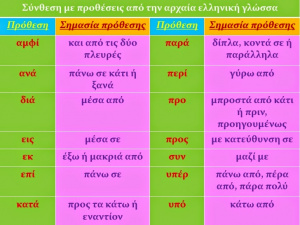Language/Ancient-greek-to-1453/Grammar/Prepositions
Prepositions are concise words that typically come before nouns, and sometimes before verbs as well. They are considered "predefined" because they have a fixed meaning and are used to indicate the relationship between the noun or verb they precede and other words in the sentence, such as declined nouns, pronouns, or adverbs. When used in this way, prepositions are traditionally known as "prepositional phrases."
In addition to their function in sentences, prepositions can be divided into two categories: proper and improper. Proper prepositions have their own meaning, while improper prepositions are formed by combining a preposition with another word.
There are 18 prepositions in total, with six being monosyllables and 12 having two syllables. Overall, prepositions play a crucial role in constructing sentences that convey clear meaning and facilitate effective communication.
Prepositions - Προθέσεις
Important Prepositions
| Μονοσύλλαβες
Monosyllables |
ἐν
En : in, among, during εἰς-ἐς En : in, into, within ἐκ-ἐξ (ἐκ becomes ἐξ before a vowel; eg: ἐξ αἵματος : out of blood) En : from, out of, forth from πρό En : in front, before, preferably at πρός En : by, in addition to
σύν En : with Fr : avec |
| Δισύλλαβες
Two-syllable |
ἀνά
En : upon, up, through
διά En : through, by means of, because
κατά En : down, along, according to
Μετά En : after, behind
Παρά En : with, near
ἀμφί En : about, around
ἀντί En : opposite, instead of, for the sake of
ἐπί En : on, for the purpose of, because of
περί En : about, near, around
En : from, =distance: starting point, origin
En : under
En : above, over, beyond because of, by reason of |
Proper Prepositions
| ἐξ (ἐκ in front of consonant)
En : from, out of, forth from
ἀντί : En : opposite, instead of, for the sake of
πρό : En : before, in front of ἀπό : En : from, = distance: starting point, origin
ἕνεκα, ἕνεκεν : En : because of, in view of |
Improper Prepositions
| ἄνευ
En: without
ἄχρι En : up to
ἕνεκα / ἕνεκεν En : because of, in view of
En : except
En : in favor of, for lite pleasure
En : separately, apart
ὡς * En : as, well as -and the particles νὴ : En : in affirmative oaths : I swear by Zeus, etc.*
μά ** En : in affirmative or negative oaths
ὡς τόν βασιλέα πέμπειν θρίαμβον
** a particle employed in affirmations and oaths and joined to an accusative of the person (for the most part, a divinity) or of the thing affirmed or sworn by. ** μά : by, in oaths, of the divinity or of the witness invoked; mostly negative, sometimes: ναί, affirmative.
|
Author
- Ευγενική χορηγία που στοχεύει να βοηθήσει μαθητές ή μη, απανταχού της Γης, που επιδίδονται στην εκμάθηση της ελληνικής γλώσσας!
- Contribution bénévole visant à aider les personnes, partout dans le monde, qui sont engagées dans l'apprentissage de la langue grecque !
- Voluntary contribution aimed at helping people, all over the world, who are committed to learning the Greek language!

